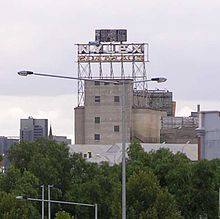- Nylex Clock
-
The Nylex Clock is an iconic neon sign sitting atop malting storage silos in the suburb of Cremorne, Victoria, Australia. It is located adjacent to the northern bank of the Yarra River and the Monash Freeway and displays the time and temperature alternately. The text also alternates displaying the words 'Nylex Plastics' that changes to 'Nylex Every Time!'. It is visible from many parts of Melbourne, particularly the Melbourne Cricket Ground, the home of Australian rules football. This linkage his referred to in the song Leaps and Bounds by musician Paul Kelly.
Contents
History
 The Nylex Clock from the Church Street Bridge.
The Nylex Clock from the Church Street Bridge.
The sign and clock were designed and built by South Melbourne company Neon Electric Signs[1] and erected in 1961 on behalf of Nylex, an Australian manufacturer of plastic products. There are 20 silos on the site, located in two groups, and were built in the 1950s and 1960s to store barley.
In 2002 a $70 million office project was proposed for the site of the silos that support the clock. The architectural firm behind the project had assessed the heritage value of the site and did not find the silos historically significant enough to be retained, but agreed the Nylex sign was of value and should be kept.[2] The redevelopment was dropped in October 2003 because of the prospect of heritage protection.[3]
The Nylex Clock had been inoperative for a number of years, until restoration works were announced in May 2004.[4] A listing on the Victorian Heritage Register[5] was also applied to the sign in March that year. The 11,340 square metre silos precinct underneath the clock was sold in September 2004 in a deal believed to be worth $8.75 million. The sign itself had been owned by Australian Neon Signs, until sold to Nylex in August 2004. The location of the clock was leased from the owner of the silo.[6]
On 29 June 2005 the clock was restarted at 7.24am, amid heavy fog and a live broadcast by radio station 3AW. The thousands of white LEDs turned on, but the time stayed stuck on 7.24am due to a 'glitch with satellite alignment' in the equipment used to keep the time and date accurate. The sign had been out of action for 14 months, with the restoration commencing in February and costing $300,000.[7] 17,000 LED globes were used, along with 800 metres of neon tubing and two kilometres of electrical cable.[8]
The use of LEDs diminished the visibility of the clock in certain locations and the globes were again replaced in December 2005 for 70-degree orange coloured LEDs.
For several days in May 2006 the clock was frozen at 6.38, with a surge protector being installed to avoid a recurrence. The clock again broke down at 5.45am on 6 September 2006 but wet weather hampered efforts to investigate the fault.[9] In December 2007 the clock stopped due to corroded electrical circuits in the control box, and was not able to be fixed until after the New Year break due to the company responsible being closed.[10]
See also
- Borsari's Corner in Carlton, Victoria
- Dingo Flour sign in North Fremantle, Western Australia
- Pelaco Sign in Richmond, Victoria
- Skipping Girl Sign in Abbotsford, Victoria
References
- ^ "Koene clocks up a local landmark:, Sunday Herald Sun, 6 March 2011, pg 35.
- ^ Royce Millar (3 December 2002). "Famous silos come to end of the road". The Age. www.theage.com.au. http://www.theage.com.au/articles/2002/12/02/1038712883068.html. Retrieved 2008-08-03.
- ^ Royce Millar (14 October 2003). "Nylex clock to stay". The Age. www.theage.com.au. http://www.theage.com.au/articles/2003/10/13/1065917342718.html?from=storyrhs. Retrieved 2008-08-03.
- ^ Rachel Wells (15 May 2004). "An icon clocks off for restoration". The Age. www.theage.com.au. http://www.theage.com.au/articles/2004/05/14/1084289883736.html?from=storylhs. Retrieved 2008-08-03.
- ^ "Nylex Sign, Victorian Heritage Register (VHR) Number H2049, Heritage Overlay HO350". Victorian Heritage Database. Heritage Victoria. http://vhd.heritage.vic.gov.au/vhd/heritagevic#detail_places;12735.
- ^ Helen Westerman (22 September 2004). "Time may change on iconic clock". The Age. www.theage.com.au. http://www.theage.com.au/articles/2004/09/21/1095651320847.html?from=moreStories. Retrieved 2008-08-03.
- ^ "Nylex clock flickers then stops". The Age. www.theage.com.au. 29 June 2005. http://www.theage.com.au/news/national/big-switchon-stalls/2005/06/29/1119724663567.html. Retrieved 2008-08-03.
- ^ "Time right for Nylex clock to operate again". ABC News Online. www.abc.net.au. 29 June 2005. http://www.abc.net.au/news/newsitems/200506/s1402758.htm. Retrieved 2008-08-03.
- ^ Jordan Chong (6 September 2006). "Nylex clock out of time". The Age. www.theage.com.au. http://www.theage.com.au/news/national/melbourne-icon-clocks-off/2006/09/06/1157222178162.html. Retrieved 2008-08-03.
- ^ Geraldine Mitchell (27 December 2007). "Glitch stops Nylex clock for at least a month". Herald Sun. www.news.com.au. http://www.news.com.au/heraldsun/story/0,21985,22974656-661,00.html. Retrieved 2008-08-03.
Further reading
External links
Coordinates: 37°49′46″S 144°59′20″E / 37.829582°S 144.988793°E
Categories:- Clock towers
- Landmarks in Melbourne
- Heritage listed buildings in Melbourne
- Victorian Heritage Register
- Individual signs
Wikimedia Foundation. 2010.

